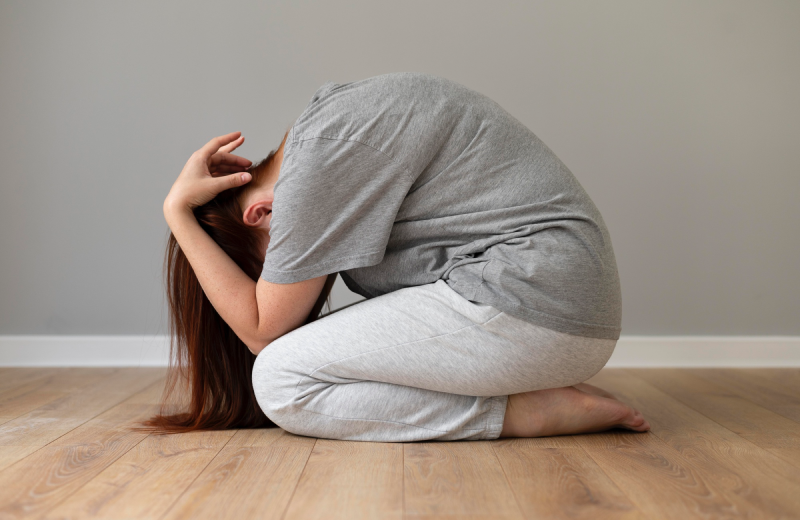Depression Treatment in Orange County
at Able to Change Recovery
Written by
Amanda Stevens
Medical
Content Writer
Written by
Medical
Content Writer
Medical Content Writer
Depression can be a burdensome load to carry. Days spent feeling numb, persistent self-doubt, and an overwhelming sense of hopelessness can make even the simplest tasks feel monumental. At Able to Change Recovery – conveniently located in Orange County, California – we refuse to let depression have the final say.
Our team of compassionate, experienced clinicians is dedicated to walking alongside our clients, providing the personalized care, evidence-based treatments, and unwavering support they need to reclaim the lives they deserve at our mental health treatment center
Depression is a mental health disorder characterized by persistent feelings of sadness, hopelessness, and a loss of interest in activities that were once enjoyable.[1] Unlike temporary mood swings or “the blues,” clinical depression is a serious disorder that can significantly impair an individual’s ability to function in daily life.
The hallmark symptoms of depression include prolonged low mood, feelings of worthlessness or excessive guilt, fatigue, difficulty concentrating, changes in sleeping or eating patterns, and recurrent thoughts of death or suicide.[2] For a diagnosis of major depressive disorder, these symptoms must be present for at least two weeks and cause significant distress or impairment in social, occupational, or other important areas of functioning.
It’s important to note that depression is not a one-size-fits-all condition. Individuals can experience depression in vastly different ways, with some exhibiting primarily physical symptoms like unexplained aches and pains while others struggle more with emotional or cognitive symptoms. Additionally, depression can co-occur with other mental health disorders, such as anxiety, PTSD, or substance abuse, further complicating the picture.
Depression can present in a wide variety of emotional, cognitive, physical, and behavioral ways. Some of the most common signs and symptoms can include:[3]
Emotional Symptoms
Cognitive Symptoms
Physical Symptoms
Behavioral Symptoms
It’s important to note that not everyone with depression will experience all of these symptoms, and the severity can vary significantly from person to person. Additionally, some individuals may mask their depression, making it challenging to recognize.

While the term depression is often used broadly, there are several recognized depressive disorders, each with its own set of defining characteristics and diagnostic criteria (many of which are according to the Diagnostic and Statistical Manual of Mental Disorders, or DSM):[4]
Depressive disorders often co-occur with other health conditions, including:[5]
Help is available in Orange County, CA (and the surrounding SoCal area) for treating depression and co-occurring disorders. At Able to Change Recovery, our depression therapy services offer a diverse range of evidence-based options and holistic approaches to help our clients find lasting relief from the symptoms of depression with our personalized treatment plans.
These therapeutic modalities include:
Depression can significantly impact various aspects of daily life, making even routine tasks feel overwhelming. Individuals may experience a lack of energy and motivation, leading to difficulties with work, school, or household responsibilities.
Social interactions often become challenging as people withdraw from friends and family, which can exacerbate feelings of loneliness and isolation. Additionally, depression can affect physical health, leading to sleep disturbances, changes in appetite, and other symptoms that further hinder daily functioning.
Medication is not always the right treatment for depression, but it can be an effective option for many individuals, especially those with moderate to severe symptoms. Antidepressants can help to balance chemicals in the brain that affect mood and emotional responses.
However, the decision to use medication should be made collaboratively with a qualified mental health professional, considering the individual's specific situation and preferences. Some people find relief through talk therapy and significant life changes alone or may prefer to combine evidence-based treatment options with medication to enhance their treatment outcomes and overcome depression.
Holistic therapies can be effective for treating depression as they address the whole person – mind, body, and spirit – rather than just the symptoms. These therapies may include practices such as yoga, meditation, acupuncture, and nutritional counseling. They can help individuals develop healthier coping mechanisms, reduce stress, and promote overall well-being. While holistic approaches are often used in conjunction with traditional therapies, many individuals report positive outcomes and improved mood when incorporating holistic methods into their treatment process and addressing environmental factors.
Recognizing the severity of depression can be challenging, but several signs indicate that it may be time to seek help. If you find that your feelings of sadness, hopelessness, or disinterest in activities persist for an extended period of time, or if these feelings interfere with your daily functioning (such as work, relationships, or self-care), it’s crucial to reach out for support. Additionally, if you experience thoughts of self-harm, suicide, or overwhelming despair (as well as chronic, debilitating depression), seeking immediate help is vital for your well-being
[1] Sawchuk, C. (2022, October 14). Depression (Major Depressive Disorder). Mayo Clinic; Mayo Foundation for Medical Education and Research. https://www.mayoclinic.org/diseases-conditions/depression/symptoms-causes/syc-20356007 on September 24, 2024
[2] National Institute Of Mental Health. (2023). Depression. National Institute of Mental Health. https://www.nimh.nih.gov/health/topics/depression on September 24, 2024
[3] NHS. (2023, July 5). Symptoms - Depression in adults. Nhs.uk; NHS. https://www.nhs.uk/mental-health/conditions/depression-in-adults/symptoms/ on September 24, 2024
[4] Harvard Health Publishing. (2020, October 13). Six common depression types - Harvard Health. Harvard Health; Harvard Health. https://www.health.harvard.edu/mind-and-mood/six-common-depression-types on September 24, 2024
[5] Pedersen, T. (2023, March 10). Common comorbidities of depression. Healthline. https://www.healthline.com/health/depression/depression-comorbidities on September 24, 2024
Adding {{itemName}} to cart
Added {{itemName}} to cart